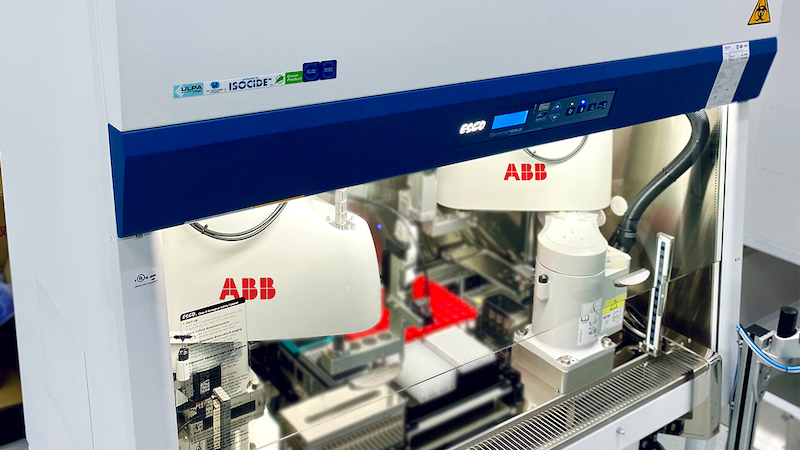ABB robots accelerate coronavirus testing in Singapore
ABB robots are accelerating coronavirus testing in Singapore through a new robotics lab system which “saves time and costs and keeps lab workers safe”, according to the company.
As part of Singapore’s efforts to enhance its nation-wide COVID-19 testing capabilities, ABB’s high-precision robots have been deployed in a new automated laboratory system, known as the Rapid Automated Volume Enhancer (RAVE).
The system automates some of the manual steps usually required in sample processing. Two sets of RAVE and associated equipment can process an industry-topping throughput of close to 4,000 samples a day. RAVE also reduces test contamination and infection risks for laboratory workers.
The innovation was co-developed by the Agency for Science, Technology and Research’s (A*STAR) Advanced Remanufacturing and Technology Centre (ARTC) and the Singapore Institute of Manufacturing Technology (SIMTech), as well as the Diagnostics Development (DxD) Hub, a national platform hosted by A*STAR.
ABB supplied four IRB 910 SCARA units, including simulation and programming support, used in the pilot testing cell. RAVE was unveiled in July 2020, and ABB has since received an order for an additional 14 robot units.

Sami Atiya, president ABB robotics and discrete automation, says: “We are honored to join Singapore’s medical ecosystem to tackle this urgent challenge, combining our industry-leading robotics technologies with the engineering and biomedical knowledge of the agencies involved.
“Together we are increasing Singapore’s testing capacity by automating key laboratory processes, with our robots undertaking a range of repetitive and dangerous tasks to improve laboratory conditions for employees, reducing the risk of contamination and fatigue.”
ABB’s RobotStudio simulation software was used to help create, simulate and test the robot installation in a virtual 3D environment. This enabled the project to be successfully realized and ramped-up quickly, without the need for major adjustments or corrections in the lab environment.
Dr David Low, CEO, ARTC, says: “Public-private partnerships play a key role in the innovation and rapid adoption of advanced manufacturing technologies, and this collaboration among A*STAR, ABB and our other partners in the ecosystem is a good example of what we can achieve together through robotics and automation to help enhance Singapore’s testing capabilities amidst the Covid-19 pandemic.”
In another example of how the company is supporting healthcare institutions, ABB’s collaborative robot, YuMi is being studied and used in a research case application at the Polytechnic University of Milan to support hospitals in serological testing for the coronavirus.
Once deployed, YuMi will be able to automate up to 77 percent of the operations required to perform the tests and analyze up to 450 samples per hour.

